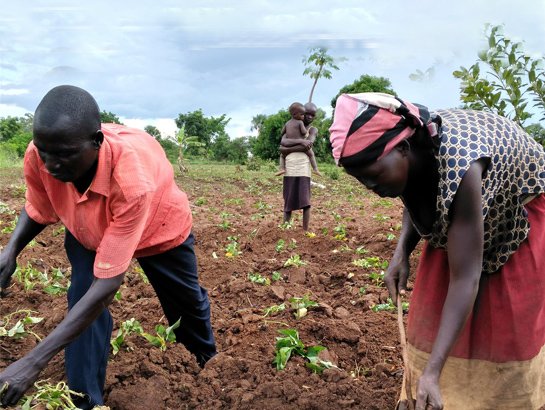When Opio Peter, a Ugandan farmer from Amach sub-county in Lira district, heard about the nutritional importance of vitamin A biofortified orange sweet potatoes (OSP) on the radio, he got interested. He immediately contacted the local extension agent working with World Vision, an implementing partner of HarvestPlus in Northern Uganda.
He was referred to Perepetua Okao, one of the OSP vine multipliers in a neighbouring sub-county, where he bought 1 bag of OSP vines for UGX 10,000 (USD 3). Peter did not own any land—so he asked a friend of his living in Lira town to allow him to cultivate the friend’s vacant land. The friend agreed without asking for any money in return. Peter planted the vines on slightly less than a quarter of an acre.
The extension agent, Monica, then trained Peter on the recommended agronomic practices for OSP. At the end of that season the yield was good, and the harvest was about four bags of OSP roots. Peter consumed some with his family of three at the time and sold the surplus in a weekly market in Amach. Each bag sold for UGX 60,000 (USD 17).
Not only is biofortified OSP high yielding, early maturing, and drought tolerant, it provides up to 100 percent of daily vitamin A needs when eaten as a regular part of the daily diet. This is critical as vitamin A deficiency impairs growth, causes eye damage leading to blindness, and increases the risk of infections such as diarrheal disease. About 32 percent of Ugandan children under 5 are estimated to be vitamin A deficient. Sweet potatoes rank third among commonly consumed food staples in Uganda, and are often eaten with beans in many parts of the country. By using biofortifcation to raise the nutritional content of sweet potaoes, they become more nourishing and help prevent diseases caused by vitamin A deficiency.
 Because of the promising yield, good market, and the fact that his family loved the taste of this new potato variety, Peter kept exploring and selling more varieties of biofortified OSP. With the proceeds, he kept expanding acreage. With technical support from the extension agent and a little experience, he planted only varieties that were suitable for his market. Peter kept planting OSP every season which led to his business flourishing in his village. He was especially thrilled that the sweet potato was nutritious and his community was benefitting greatly from the biofortified variety.
Because of the promising yield, good market, and the fact that his family loved the taste of this new potato variety, Peter kept exploring and selling more varieties of biofortified OSP. With the proceeds, he kept expanding acreage. With technical support from the extension agent and a little experience, he planted only varieties that were suitable for his market. Peter kept planting OSP every season which led to his business flourishing in his village. He was especially thrilled that the sweet potato was nutritious and his community was benefitting greatly from the biofortified variety.
Then in 2018, with proceeds from his OSP business of selling roots and vines, he bought a 2 acre garden for UGX 1,800,000 (USD 500) and built a permanent house for his family, which they moved into from their grass thatched house the same year.
The following planting season, Peter expanded his farms and planted about 5 acres of land with OSP vines. “I’ve remained cultivating OSP because I’m able to get money from this crop as there is demand in the market. If it was just for home consumption, I would never have expanded the land,” said Peter happily.
Peter has plans for not just continuing to sell OSP roots but making products from them so that he can expand his business and share the nutritional benefits with a wide variety of consumers in his community. After being convinced that engaging in OSP production and marketing is a profitable venture, neighbours, friends and extended family have since been getting OSP vines from Peter’s garden. This season Peter has given out more than 11 bags to 4 other people in exchange for fowl.
The local radio programs that initially sparked Peter’s interest were aired to make the farmers aware of the nutritional importance of OSP as part of activities for the Meals for Nutrition in Uganda (MENU): Biofortified Solutions project, which is supported by the United States Agengy for Internaitonal Development (USAID) through the U.S. Feed the Future Initiative. The biofortification activities of the MENU project is implemented by HarvestPlus with various partners.
Research has shown that uptake of vitamin A OSP benefits the people of Uganda both in farming and in nutrition. A first impact evaluation, carried out by teams from the International Food Policy Research Institute (IFPRI), found that the vitamin A status of vitamin A-deficient children improved after they consumed OSP. A second impact evaluation, which was supported by the International Initiative for Impact Evaluation (3ie), showed that four years after HarvestPlus distributed OSP, farmers’ adoption and cultivation of it had stabilised at approximately 50 per cent in two out of three districts.
HarvestPlus supports Uganda’s National Agricultural Research Organisation (NARO) to breed, test, and release varieties of OSP developed in partnership with the International Potato Center (CIP). HarvestPlus strives to improve nutrition and public health in Uganda by promoting OSP that provides more vitamin A in the diet by closely working with 52 national partners like processors and vine multipliers, and 17 partners drawn from government, business, and civil society. To date, the vitamin A OSP work is reaching nearly 960,000 smallholder households—with almost 4.7 million household members— that are growing vitamin A enriched OSP for the better health of their communites.
